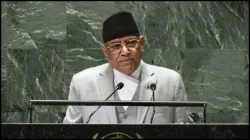Nepal's ruling coalition party splits, govt manages narrow majority in parliament
The split came after JSP-N chair and deputy PM Upendra Yadav was rumoured to ally with the opposition to topple the Prachanda government. As many as 29 central committee members and seven lawmakers jointly applied to the Election Commission to form a new party.

Kathmandu: The Janata Samajbadi Party-Nepal (JSP-N), one of the coalition partners in the Prime Minister Pushpa Kamal Dahal-led government, has split after a majority of its lawmakers and over two dozen central committee members applied for a new party at the Election Commission, following internal discontent. A faction led by the party's federal council chair Ashok Rai was formally registered as a new party on Monday.
The Rai-led faction registered the application for a new party while the party's chair Deputy Prime Minister Upendra Yadav, who is also minister for health and population, is on a trip abroad. Pradip Yadav, a lawmaker of the JSP-N, said that 29 central committee members and seven lawmakers have jointly applied to form a new party.
Of the party’s 12 House of Representatives members, seven - Rai, Sushila Sherstha, Pradip Yadav, Nawal Kishor Sah, Ranju Kumari Jha, Birendra Mahato and Hasina Khan - have supported the new party named ‘Janata Samajbadi Party’ (without the ‘Nepal’ of the mother party). Party insiders said that Rai registered the new party at the advice of PM Prachanda to counter Upendra Yadav, whose relations with the ruling alliance have soured lately.
Why has the party split?
There have been rumours that Yadav was trying to ally with the opposition Nepali Congress and the ruling party alliance CPN-Unified Socialist-led by Madhav Kumar Nepal after NC President Sher Bahadur Deuba reportedly offered the Prime Minister's post to Yadav to topple the Prachanda-led government. Leaders of the Rai-led faction claimed they had to revolt against the party leadership as Yadav was running the party in an autocratic way.
“The chair ran the party unilaterally and disrespected lawmakers,” Pradip said. Forest and Environment Minister Nawal Kishor Sah Sudi, who also quit the party, claimed that the need for a new outfit was felt after the chair tried to break the ruling coalition. “We took this decision for the stability of the incumbent government,” Sudi said.
Coalition government manages narrow majority
Despite the split, the ruling coalition consisting of the CPN-UML led by former PM K P Sharma Oli and the CPN (Maoist Center) has managed to maintain a narrow majority in the Parliament with the latest political developments. The split in the JSP-N will not affect the government’s stability at the moment, said Central Member of CPN-Maoist Centre Sunil Kumar Manandhar, the former Environment Minister.
PM Prachanda won a crucial vote of confidence in March for the third time after he broke the alliance with two opposition parties and formed a new coalition government with KP Sharma Oli-led Communist Party of Nepal (Unified Marxist–Leninist) party. Dahal, a former Maoist guerrilla leader in the mountainous nation, formed a coalition cabinet dominated by the Nepali Congress party as well as other smaller groups last year.
According to party officials, Dahal, 69, wanted to remove some "non-performing" ministers including Finance Minister Prakash Sharan Mahat, who was from the Nepali Congress, saying he had not done enough to boost the growth of the $40 billion economy. Nepal has had 13 governments since it abolished its 239-year-old monarchy in 2008 and became a republic.
Another no-confidence motion?
Unless the CPN-Unified Socialist and JSP-N withdraw support from the government there is no need to seek a vote of confidence by the Prachanda government, Manandhar added. “Lawmakers alone don't make a party. A majority of party leaders are with us,” said Manish Suman, the party spokesperson.
Mohammad Istiyak Rai, a leader of the party, had decided to challenge Yadav, the party chair, in the upcoming general elections. However, the party split before the convention could be held. Rajendra Shrestha has been named the federal council chair of the yet-to-be-legalised party, which has announced a 31-member central committee.
Though the Rai-led faction has sought recognition as a new party under the Political Party Act, there are no clear legal provisions to guide the party formation process after a split in an existing one.
On August 18, 2021, the then Sher Bahadur Deuba government issued an ordinance to amend the Act to ease the split of two parties - the CPN-UML and the Janata Samajbadi Party. On August 26 of the same year, Madhav Kumar Nepal of the UML and Mahantha Thakur of the Janata Samajbadi Party registered new parties, the CPN (Unified Socialist) and the Loktantrik Samajbadi Party, respectively.
Before the split, in the 275-member federal lower house, the ruling coalition had 154 seats - 16 more than the magic number of 138. Among them, the CPN-UML has 79 seats (including the Speaker and one suspended lawmaker), the CPN (Maoist Centre) has 32, the Rashtriya Swatantra Party has 21, the JSP-N has 12 seats and the CPN (Unified Socialist) has 10 seats.
(with inputs from PTI)
ALSO READ | Jaishankar on Nepali notes featuring Indian territory: 'Unilateral measures will not change ground reality'